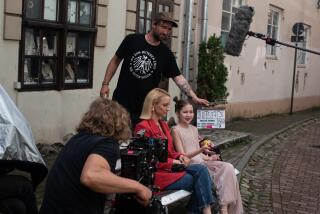A Freedom Fighter Goes ‘Home’ : Nationalism: L.A. lawyer returns to her roots to aid Latvia’s independence bid. She says she’s a bridge between her ancestral homeland and West.
RIGA, Soviet Union — While Inese Birzniece was growing up in Pomona, Latvia was the fairy-tale land of her parents’ childhood, a scary place from which her mother and aunt fled in a horse-drawn wagon during World War II as bombs exploded in the background.
She was drawn to romantic images of the land of her forebears, and her first trip to Latvia in 1972 increased her love for the country.
“It was really important for me to see that Latvia was not just a picture in a book on my parents’ bookshelf,” said Birzniece, a 39-year-old corporate lawyer from Los Angeles. Yet the Kremlin’s grip was so tight that she never dared hope that Latvia, annexed by the Soviet Union in a secret 1939 pact with Nazi dictator Adolf Hitler, would ever again be free.
In the last several years, however, as Latvians’ desire for independence grew into a mass movement, Birzniece’s trips to her parents’ homeland grew more frequent and longer. Now Birzniece, who has undergraduate and law degrees from UCLA, is spending at least a year in Riga, the Latvian capital, to help its separatist Parliament fight for independence from the Soviet Union.
“I never thought this day would come,” she said. “It was so important to me that Latvia become a free and independent country, but it never seemed possible. Now, when there’s a chance, this is something I really want to work for.”
In returning to her motherland, Birzniece also returned to her proper Latvian surname. As a practicing lawyer she was known by her married name, Lacey, even after she was divorced. While growing up in a middle-class neighborhood in Pomona, she went by Birznieks, which is the masculine version of Birzniece.
While Soviet troops were cracking down in the Baltics early last month, Birzniece stayed in the Parliament building for days on end, catching a few hours of sleep on a mattress on the floor of one of the ornate halls.
Fearing an attack by pro-Soviet forces, Latvians had barricaded the roads leading to the Parliament: one blocked by reinforced concrete blocks, another by huge stones and a third by pressed wood, barbed wire and a gigantic fishing net. As further protection, several trucks, buses and fire engines were parked at the entrances to the old city.
“My whole life is in this building,” Birzniece said as she took a rare break in the Parliament’s coffee shop. “The city beyond the barricade seems like another land.”
Most of her time is spent briefing scores of foreign and Latvian journalists, interpreting Latvian into English at news conferences, translating official documents and occasionally giving legal or political advice to the Latvian government.
“I see myself as a bridge between Latvia and the West,” she said. “My advantage is that I grew up on Western media. My legal training is really helpful too, because I know how to think logically, like a lawyer.”
When a reactionary group called the All-Latvian Public Salvation Committee proclaimed it had taken power in Latvia, Birzniece persuaded Latvian President Anatolijs Gorbunovs to immediately deny the claim.
She says her role has become more important as a “war of information” grows increasingly fierce between those who want Latvia to remain part of the Soviet Union and those who, like the government and Parliament, favor independence.
Disinformation, especially among non-Latvians, is an important tactic in the fight to keep the Baltics. In some large factories, “news” was broadcast that Gorbunovs had resigned (he had not).
“They’re using disinformation to try to stir up mass emotions,” Birzniece said. “It’s really manipulative of the people.”
Despite the attack by pro-Moscow conservatives, Birzniece said she has been encouraged by the resoluteness of the Latvian people, who built the elaborate barricades and stand guard by the dozens at the Parliament and other government buildings night after night.
“I’m convinced people are not going to let it go back,” she said in a recent interview. “The determination. . . . That’s what convinced me. It’s most encouraging when Russians and other non-Latvians come out to work on the barricade.”
Although she has a slight accent and makes an occasional grammatical mistake when speaking Latvian, Birzniece says she is treated as a native, not a foreigner. And the more time she spends here, the more she feels alienated from her life in America.
Birzniece’s parents emigrated to America after World War II. Her father, Jekabs Birznieks, 79, a retired employee of Pomona Tile Factory, was drafted into the German army and held in an Allied prisoner of war camp before he emigrated.
Her mother, Daina Birznieks, 72, a retired postal worker, traveled west by horse and wagon with her sister, trying to stay in front of the advancing Red Army. They ended up in the Allied zone of Germany, where she met her future husband.
Although Birzniece was born in Southern California, she spoke Latvian in her home and did not learn English until she went to kindergarten. She went to Latvian school on weekends throughout her childhood and has been involved in the Southern California Latvian Assn., doing everything from folk dancing to leading the organization. About 3,000 Latvians live in Los Angeles.
“I am an American citizen, but I really feel Latvian,” Birzniece said. “I don’t want to sound unpatriotic, but that’s how I feel.
“I was somewhat unhappy the last time I was in the United States because I felt I did not fit in anymore,” she said. “We have such a material life in Los Angeles--people are worried about wearing the newest clothes and driving the newest cars. But here people are actively involved in defending their future. Everything else seemed so boring.”
After spending three months in Latvia in the fall of 1989 working as a volunteer for the Popular Front independence movement, she decided to return for a longer period and arrived last June 24.
With an invitation from the Latvian Lawyers Assn., she was given a year’s visa to work as an editor of the Popular Front’s English-language newspaper, Awakening. But soon she realized she only had time to work with the Parliament.
Other Latvian-Americans have also returned to Latvia to visit, do business or work with the independence movement, but most have stayed only a few months.
Her decision to leave her comfortable apartment and her well-paying job as a labor lawyer at the Century City law firm of Jackson, Lewis, Schnitzler & Krupman baffles her parents and her new colleagues in Latvia.
“My parents were very upset,” Birzniece said. “They couldn’t understand why I was giving up a high salary, my nice apartment, my car and everything that I had achieved. But it was very important to me.”
In Pomona, Daina Birznieks said she and her husband are concerned about their daughter because of the explosive situation in Latvia. “I’m proud, but I worry,” she said. “It looks dangerous.”
She said her husband was more upset about her daughter’s long stay in Latvia than she, and, in fact, “said it was my fault” because she taught her daughters the Latvian language and customs.
Inese “was working and had a good job. He’s upset because he wants the kids around--it’s Old World thinking,” she said, adding that their daughter told her before leaving for Latvia: “Mama, I have to help. They’ve been 50 years under communism.”
As a member of the Latvian Parliament staff, Inese Birzniece’s monthly salary is 500 rubles, or about $280 at the inflated commercial rate of exchange. Her home in Riga is a small room with a bath in a hotel near the Parliament building. She eats most of her meals at the Parliament’s modest cafeteria. The demands of her job leave her little time for social life.
“Deputies often ask me, ‘How do you put up with all the poverty?’ But I tell them, ‘I didn’t come here to go shopping; I came here to do something significant.’
“I’ve always been an idealist. Now when I have a chance to do something real--rather than spend my time thinking about what kind of car to buy with all my money. I have to do it.”
Birzniece’s future is a bit blurry. Although she initially planned to return to California when her year runs out in June, the prospect of staying here permanently is increasingly attractive.
“I’m afraid this is a reason my parents were fearful about my decision to come back,” she said. “My roots here get deeper with every trip.”
(Her parents say they hope she will return to the United States soon, but if she decides to stay, they will understand: “We thought, if she really likes it, then let her stay,” her mother says.)
Under a new Latvian property law, Birzniece plans to make a bid for ownership of the farmhouse her grandfather built in the 1920s in a small village called Matisi in northern Latvia.
“I know this sounds really L.A., but there is an aura in that house,” she said. “Besides, I’m the local celebrity.”
Staff writer Mike Ward, in Pomona, contributed to this story.
More to Read
Sign up for Essential California
The most important California stories and recommendations in your inbox every morning.
You may occasionally receive promotional content from the Los Angeles Times.










